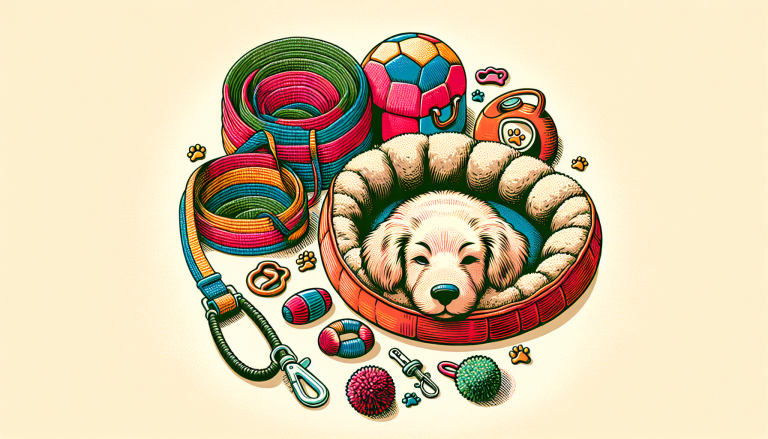Have you ever wondered which dog breeds make the best therapy pets? Look no further! In this article, we will explore the top 10 breeds that are known for their exceptional therapy abilities. Whether you’re considering getting a therapy pet for yourself or someone you know, this list will help you make an informed decision and find the perfect furry companion to bring joy and comfort to those in need. From Golden Retrievers to Cavalier King Charles Spaniels, these breeds are sure to steal your heart with their gentle and loving nature. Let’s dive in and discover the top 10 best breeds for therapy pets!
Table of Contents
Toggle1. Labrador Retriever
Temperament and Characteristics
Labrador Retrievers are known for their friendly and outgoing personalities. They have a natural affinity for people and are often described as being gentle and patient. With their kind and loving nature, Labradors make excellent therapy pets. They are easy to train and are highly adaptable to various environments, making them suitable for many different therapy settings.
Labradors are medium to large-sized dogs with a muscular build. They have a short, dense coat that comes in various colors, including yellow, black, and chocolate. Their expressive eyes and friendly expression add to their overall charm.
Training and Adaptability
One of the reasons why Labradors are such great therapy pets is their trainability. They are highly intelligent and eager to please, which makes them quick learners. Whether it’s learning basic obedience commands or more complex tasks, Labradors excel in training. Their ability to follow instructions and stay focused makes them ideal for therapy work.
Labradors are also highly adaptable dogs. They can easily adjust to different environments and are comfortable in a variety of settings, whether it’s a hospital, nursing home, or school. They have a calm and even temperament, which allows them to remain composed even in stressful situations. Their adaptability makes it easier for them to connect with individuals from all walks of life.
Therapeutic Benefits
Labrador Retrievers provide numerous therapeutic benefits to those they interact with. The unconditional love and affection they offer can help reduce stress, anxiety, and depression. Their gentle nature provides comfort and emotional support to individuals in need.
Labradors are often used in therapy sessions for children with disabilities or individuals with mental health conditions. Their presence can help increase confidence, improve social skills, and promote a sense of emotional well-being. Additionally, Labradors are excellent at providing physical support, such as assisting individuals with mobility issues.
2. Golden Retriever
Temperament and Characteristics
Golden Retrievers are known for their friendly and tolerant nature, making them exceptional therapy pets. They have a reputation for being patient, reliable, and trustworthy, which is why they are often chosen to work in therapy settings. These dogs have a natural affinity for people and thrive in social environments.
Golden Retrievers have a medium to large build with a sturdy frame. They have a dense, water-repellent coat that comes in shades of golden, which gives them their distinct appearance. Their kind eyes and gentle expressions make them instantly lovable.
Training and Adaptability
Golden Retrievers are highly trainable dogs, making them an excellent choice for therapy work. They are intelligent and eager to please, which makes the training process easier and more enjoyable. Golden Retrievers excel in obedience training and can also be trained for specialized tasks, such as retrieving items or providing physical support.
Just like Labradors, Golden Retrievers are highly adaptable to different environments. They are comfortable in a variety of settings, including hospitals, schools, and rehabilitation centers. Their calm and patient demeanor helps them connect with individuals of all ages and backgrounds, allowing for effective therapy sessions.
Therapeutic Benefits
Golden Retrievers have a natural ability to provide unconditional love and emotional support to those in need. Their friendly and gentle nature helps create a calming and soothing environment, which can reduce stress and anxiety. Golden Retrievers are often used as therapy dogs for children with autism or individuals dealing with trauma or grief.
These dogs are skilled at providing comfort and companionship to individuals in hospitals or nursing homes. Their presence can help alleviate feelings of loneliness and provide a sense of joy and happiness. Golden Retrievers also excel in animal-assisted therapy, where they can assist individuals with physical therapy or rehabilitation exercises.
3. Poodle
Temperament and Characteristics
Poodles are intelligent and elegant dogs that make excellent therapy pets. They are known for their hypoallergenic coats, which shed minimally and make them suitable for individuals with allergies. Poodles come in three recognized sizes: Standard, Miniature, and Toy. Each size has its own unique characteristics but shares the same intelligence and trainability.
Poodles have a distinctive curly or corded coat, which requires regular grooming to maintain its appearance. They come in a variety of colors, including white, black, brown, and apricot. Their expressive eyes and proud stance give them a regal and sophisticated look.
Training and Adaptability
Poodles are highly trainable dogs that thrive on mental stimulation. They are quick learners and excel in obedience training and agility exercises. Poodles have a natural instinct to please their owners, making them highly responsive to commands and tasks. Their intelligence and trainability make them an ideal choice for individuals looking for a therapy dog.
Poodles are also adaptable dogs that can adjust to different environments. They are comfortable in both urban and rural settings and can easily adapt to various living conditions. Their versatility and calm demeanor make them suitable for therapy work in a variety of settings, from hospitals to nursing homes.
Therapeutic Benefits
Poodles offer numerous therapeutic benefits to those they interact with. Their hypoallergenic coats make them ideal for individuals with allergies, allowing more people to benefit from their presence. Poodles are often used in therapy sessions for individuals with anxiety or post-traumatic stress disorder. Their calm and empathetic nature can help reduce anxiety symptoms and provide emotional support.
These dogs also excel in assisting individuals with physical disabilities. Poodles can be trained to perform tasks such as retrieving items, opening doors, or providing stability and balance to those with mobility issues. Their intelligence and willingness to learn make them highly effective therapy dogs in various therapeutic contexts.
4. Cavalier King Charles Spaniel
Temperament and Characteristics
The Cavalier King Charles Spaniel is a small and friendly breed that is well-suited for therapy work. They are known for their affectionate and sociable nature, making them great companions for individuals in need of emotional support. Cavaliers have a gentle expression and a sweet temperament, which adds to their overall charm.
Cavalier King Charles Spaniels have a medium-length coat that comes in various colors, including tricolor, black and tan, and ruby. Their floppy ears and expressive eyes make them instantly recognizable and endearing. Despite their small stature, Cavaliers have a big heart and a lot of love to give.
Training and Adaptability
Cavaliers are generally easy to train due to their eager-to-please attitude. They are intelligent dogs that respond well to positive reinforcement training methods. Cavaliers have a desire to please their owners, which makes the training process enjoyable for both the dog and the handler. Their small size also makes them easy to handle and transport, which is essential for therapy work.
These dogs are adaptable and can thrive in different environments. Whether it’s visiting hospitals, schools, or assisted living facilities, Cavaliers can handle various social situations with ease. Their gentle and patient nature allows them to connect with individuals of all ages, making them excellent therapy pets.
Therapeutic Benefits
Cavalier King Charles Spaniels offer numerous therapeutic benefits to those they interact with. Their affectionate and loving nature can help reduce stress and anxiety. Cavaliers are often used as therapy dogs for individuals with dementia or Alzheimer’s disease because of their calming presence and ability to provide comfort.
The small size of Cavaliers makes them ideal for lap therapy, where they can sit on an individual’s lap and provide physical comfort. Their gentle demeanor and willingness to be held and cuddled make them perfect therapy companions. Cavaliers are also known to be excellent with children, making them suitable for pediatric therapy sessions.
5. Beagle
Temperament and Characteristics
Beagles are friendly and sociable dogs that make great therapy pets. They have a playful and curious nature, which makes them appealing to individuals in therapy settings. Beagles are medium-sized dogs with a compact build. They have a short and dense coat that comes in various colors, such as tricolor, lemon, and red and white.
Beagles have a distinctive howl or bay, which is an endearing trait for many dog lovers. Their expressive eyes and wagging tail reflect their happy and charming personality. These dogs are full of energy and enthusiasm, making them great companions for therapy work.
Training and Adaptability
Beagles are intelligent dogs but can be independent at times. Despite their independence, they can still be trained effectively with positive reinforcement techniques. Beagles respond well to rewards and affection, which makes training a positive experience for both the dog and the handler. Their intelligence allows them to learn and perform various tasks required in therapy work.
In terms of adaptability, Beagles can thrive in different settings as long as there are outlets for their energy and stimulation. They are known for their love of outdoor activities, such as scent work or tracking, which can be incorporated into therapy sessions. Beagles are sociable dogs that enjoy spending time with people and can easily connect with individuals of all ages.
Therapeutic Benefits
Beagles offer numerous therapeutic benefits to those they interact with. Their playful and friendly nature can bring joy and happiness to individuals in therapy settings. Beagles are often used in animal-assisted therapy programs for children with developmental disabilities or individuals with mental health conditions. Their presence can help improve social skills, reduce anxiety, and promote emotional well-being.
These dogs are also excellent companions for individuals with mobility issues. Beagles can be trained to provide physical support, such as fetching items or assisting with balance. The energetic and enthusiastic nature of Beagles can provide motivation and encouragement during rehabilitation exercises or physical therapy sessions.
6. French Bulldog
Temperament and Characteristics
French Bulldogs, also known as Frenchies, are small but sturdy dogs that are well-suited for therapy work. They are known for their affectionate and easygoing nature, which makes them reliable therapy companions. French Bulldogs have a distinct appearance with their bat-like ears and wrinkled face, making them instantly recognizable and endearing.
Frenchies have a short, smooth coat that comes in various colors, including brindle, fawn, and white. Their expressive eyes and comical expressions add to their overall charm. Despite their small size, French Bulldogs have a muscular build that gives them a unique and adorable appearance.
Training and Adaptability
French Bulldogs are intelligent dogs that can be trained effectively with positive reinforcement techniques. They respond well to rewards and praise, which makes training enjoyable for both the dog and the handler. Frenchies have a desire to please their owners and are eager to learn new commands and tasks.
In terms of adaptability, French Bulldogs can thrive in different therapy settings. Their small size makes them suitable for visits to hospitals, nursing homes, or schools. Frenchies have a calm and relaxed demeanor that allows them to connect with individuals in need of emotional support or companionship.
Therapeutic Benefits
French Bulldogs offer numerous therapeutic benefits to those they interact with. Their affectionate nature and love for human companionship can help reduce stress and anxiety. Frenchies are often used as therapy dogs for children with autism or individuals dealing with mental health conditions. Their presence can promote emotional well-being and provide a sense of comfort.
These dogs excel in providing companionship to individuals in need, such as the elderly or individuals with disabilities. French Bulldogs are known to be excellent lap dogs that enjoy being held and cuddled. Their small size and gentle demeanor make them ideal for providing physical comfort and support during therapy sessions.
7. Yorkshire Terrier
Temperament and Characteristics
Yorkshire Terriers, commonly known as Yorkies, are small but energetic dogs that can make great therapy pets. They are known for their confident and self-assured nature, which allows them to handle various therapy settings. Yorkies have a long, silky coat that comes in shades of blue and tan. Their small size and elegant appearance make them popular therapy companions.
Yorkshire Terriers have expressive eyes and a proud stance that reflect their confident personality. Despite their small size, Yorkies have a big heart and a bold attitude. They are often described as being feisty but also affectionate and loyal.
Training and Adaptability
Yorkshire Terriers are intelligent dogs that respond well to positive reinforcement training methods. They have a desire to please their owners, making them eager learners. Yorkies can be trained to perform various tasks required in therapy work, such as following commands or providing comfort to individuals in need.
In terms of adaptability, Yorkies can thrive in different therapy settings. Despite their small stature, they are confident and outgoing, which allows them to interact with individuals of all ages. Yorkies can easily adjust to different environments, making them suitable for visits to hospitals, nursing homes, or schools.
Therapeutic Benefits
Yorkshire Terriers offer numerous therapeutic benefits to those they interact with. Their small size and friendly nature make them ideal companions for individuals in therapy settings. Yorkies are often used in animal-assisted therapy programs for individuals with mental health conditions, such as anxiety or depression. Their presence can provide emotional support and a sense of calm.
These dogs are also excellent at providing companionship to individuals who may be feeling lonely or isolated. Yorkies enjoy being in close proximity to their owners and thrive on human companionship. Their small size allows them to sit on laps and provide physical comfort during therapy sessions.
8. Bichon Frise
Temperament and Characteristics
Bichon Frises are small and cheerful dogs that excel in therapy work. They are known for their friendly and affectionate nature, which makes them great companions for individuals in need of emotional support. Bichons have a distinctive curly, hypoallergenic coat that requires regular grooming to maintain its appearance. Their small size and adorable demeanor make them popular therapy pets.
Bichon Frises have dark, round eyes and a fluffy, white coat that gives them a teddy bear-like appearance. Their happy and playful expressions reflect their overall temperament. Despite their small size, Bichons are energetic and lively dogs that enjoy spending time with people.
Training and Adaptability
Bichon Frises are intelligent dogs that are eager to please their owners. They respond well to positive reinforcement training methods and enjoy learning new commands and tricks. Bichons have a playful and curious nature, which makes training sessions engaging and fun for both the dog and the handler.
In terms of adaptability, Bichon Frises can thrive in different therapy settings. Whether it’s visiting hospitals, nursing homes, or schools, Bichons can easily adjust to various environments. Their friendly and sociable nature allows them to connect with individuals of all ages, providing companionship and emotional support.
Therapeutic Benefits
Bichon Frises offer numerous therapeutic benefits to those they interact with. Their affectionate and cheerful nature can help reduce stress and anxiety. Bichons are often used in therapy programs for individuals with developmental disabilities or individuals experiencing grief or trauma. Their presence can provide emotional comfort and promote a sense of joy and happiness.
These dogs are also excellent at providing physical comfort. Bichons enjoy being held and cuddled, making them ideal lap dogs during therapy sessions. Their small size and hypoallergenic coat make them suitable for individuals with allergies, allowing more people to benefit from their presence.
9. Boxer
Temperament and Characteristics
Boxers are energetic and friendly dogs that can make great therapy pets. They are known for their playful and affectionate nature, which makes them excellent companions for individuals in need of emotional support. Boxers have a muscular and athletic build, with a short and shiny coat that comes in various colors, such as fawn or brindle.
Boxers have a distinct expression with their squarish head, wrinkled forehead, and dark, expressive eyes. Their endearing features and happy-go-lucky personality make them instantly lovable. Despite their energetic nature, Boxers have a gentle and patient side, which is essential for therapy work.
Training and Adaptability
Boxers are intelligent and eager to please, making them highly trainable dogs. They respond well to positive reinforcement training methods and enjoy learning new commands and tricks. Boxers have a natural instinct to protect and serve their owners, which makes them an excellent choice for therapy work.
In terms of adaptability, Boxers can thrive in various therapy settings. They are comfortable in both urban and rural environments, allowing them to work in hospitals, nursing homes, or schools. Boxers have a friendly and outgoing nature that allows them to connect with individuals of all ages, from children to the elderly.
Therapeutic Benefits
Boxers offer numerous therapeutic benefits to those they interact with. Their playful and affectionate nature can bring joy and laughter to individuals in therapy settings. Boxers are often used in animal-assisted therapy programs for children with developmental disabilities or individuals with trauma or anxiety. Their presence can help improve social skills and promote emotional well-being.
These dogs are also excellent at providing physical comfort and support. Boxers have a sturdy build that allows them to assist individuals with balance or stability issues. Their strength and loyalty make them effective therapy dogs for individuals with physical disabilities or those undergoing rehabilitation or physical therapy.
10. Great Dane
Temperament and Characteristics
Great Danes are big-hearted and gentle giants that can excel in therapy work. They are known for their patient and friendly nature, which makes them ideal companions for individuals in need of emotional support. Great Danes have a massive build and are one of the tallest dog breeds in the world. They have a short, dense coat that comes in various colors, such as fawn, brindle, or black.
Great Danes have a distinctive head with a noble expression and expressive eyes. Despite their size, they have a calm and mellow demeanor that reflects their gentle nature. Great Danes are often described as being affectionate and good-natured, making them wonderful therapy pets.
Training and Adaptability
Great Danes are intelligent dogs that are eager to please their owners. They respond well to positive reinforcement training methods and enjoy learning new commands and tasks. Great Danes have a desire to be close to their handlers, which makes them attentive and responsive during training sessions.
In terms of adaptability, Great Danes can thrive in different therapy settings. Although their size may require some accommodation, Great Danes have a calm and steady temperament that allows them to interact with individuals of all ages. They can adapt to various environments, providing companionship and emotional support where needed.
Therapeutic Benefits
Great Danes offer numerous therapeutic benefits to those they interact with. Their gentle and affectionate nature can provide a sense of calm and emotional support. Great Danes are often used in therapy programs for individuals with anxiety or post-traumatic stress disorder. Their presence can help reduce anxiety symptoms and promote emotional well-being.
These dogs are also effective at providing physical comfort and support. Great Danes have a sturdy build that allows them to provide stability and balance to individuals with mobility issues. They can be trained to assist individuals with tasks such as retrieving items or providing physical support during therapy sessions.








